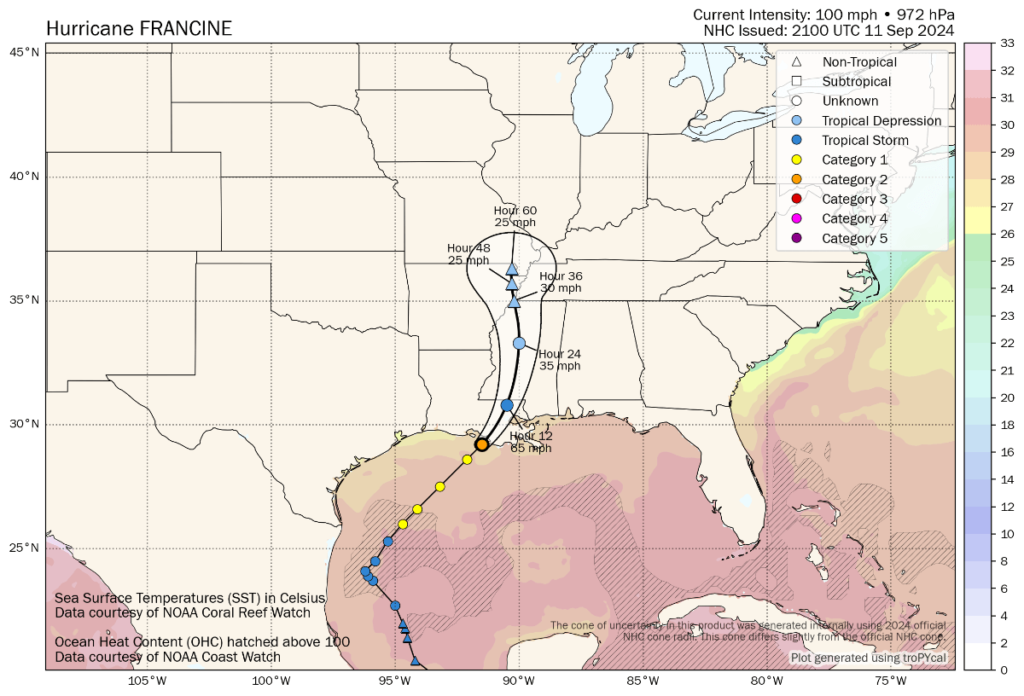Hurricane Francine strengthens to Category 2 100mph winds before Louisiana landfall

Francine was upgraded to a hurricane last night and the sixth named storm of the 2024 Atlantic hurricane season has strengthened to sustained winds of 100 mph and now heads for landfall in Louisiana, where reinsurance broker Gallagher Re anticipates insured losses in the low single digit billions of dollars.
Hurricane Francine currently has 100 mph sustained winds and higher gusts, while the forecast is for it to retain those wind speeds over the final hours up to landfall which is expected shortly today.
Francine had been slower to gain structure than had originally expected as it battled dry air and wind shear, which has saved the Louisiana coast from a more impactful storm it now seems.
However, given the warmth of Gulf waters, intensification right up to landfall cannot be ruled out over the rest of today, before landfall is forecast for the central Louisiana coast later today.
The landfall region is low-lying, so storm surge exposed, but relatively sparsely populated, while further inland areas like Baton Rouge will be affected, but hurricane Francine is expected to weaken quickly once onshore.
Reinsurance broker Gallagher Re said, “Based on the current NHC forecast track and initial storm surge inundation / rainfall expectations, it would correlate with insured losses for the private insurance market likely exceeding USD1 billion. This would align with recent historical Category 1 landfalling storms in Louisiana.
“The overall expectation should Francine strike Louisiana as a strong Category 1 storm, is that insured losses would remain roughly in the ballpark of USD1 billion and be highly manageable for the re/insurance industry.”
The broker also cautioned, “Should Francine strengthen more than originally anticipated (current NHC landfall forecast: 90 mph; strong Category 1), then wind and water-related losses (private insurance market and NFIP) might result in notably higher estimates. Recent Category 2 storms in the state have recorded insured loss costs into the low or mid-single-digit billions (USD).”
Some tornado activity is expected in the eyewall and weather that hurricane Francine will bring ashore, meaning locally impactful damages are possible, while storm surge flooding is anticipated.
The current forecast and NHC outlook still suggest that, while potentially impactful for the region around landfall, Francine is unlikely to be too much of a concern for reinsurance carriers and the insurance-linked securities (ILS) market, with the primary market likely to retain the largest share of its relatively low losses.
You can see the current location and forecast cone for tropical storm Francine below, from Tomer Burg’s website:
The NHC said in its latest update, “At 400 PM CDT (2100 UTC), the center of Hurricane Francine was located near latitude 29.2 North, longitude 91.5 West. Francine is moving toward the northeast near 17 mph (28 km/h). This general motion should continue through this afternoon, and Francine is anticipated to make landfall in Louisiana within the warning area in the next few hours. After landfall, the center is expected to cross southeastern Louisiana tonight, then move northward across Mississippi on Thursday and Thursday night.
“Reports from an Air Force Reserve Hurricane Hunter aircraft indicate that maximum sustained winds are now near 100 mph (155 km/h) with higher gusts. Little change in strength is expected before landfall. Francine is expected to rapidly weaken after landfall, and the system is forecast to become post-tropical Thursday night or Friday.”
Hurricane Francine is forecast to bring total rainfall of 4 to 8 inches, with local amounts to 12 inches across eastern Louisiana, Mississippi, far southern Alabama and the western Florida Panhandle through Friday morning, which could lead to considerable flash and urban flooding in areas where rainfall has been prevalent in recent weeks.
A storm surge of 5 to as much as 10 feet is forecast as well, particularly from Burns Point, LA to Port Fourchon to with 4 to 7 feet forecast more widely along the coast, a life threatening situation for any that have not evacuated.
As said, at the currently forecast landfall intensity, hurricane Francine is still unlikely to overly trouble the reinsurance, catastrophe bond and ILS industries with any significant loss, while primary insurers should be easily able to absorb their shares, given the latest forecast.
You can track this and every Atlantic hurricane season development using the tracking map and information on our dedicated page.






